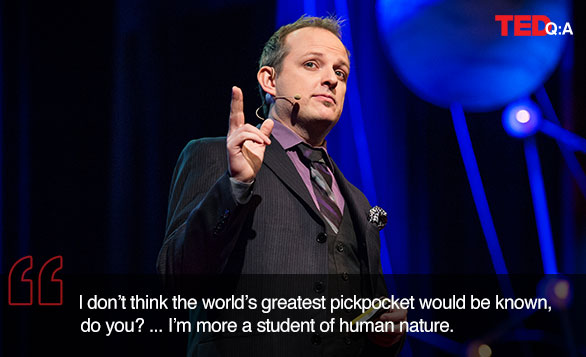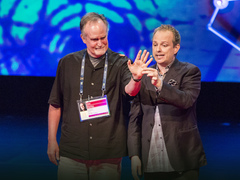
If you ever meet Apollo Robbins in person, hold onto your wallet. The professional sleight-of-hand artist, who has been studying magic for more than 25 years, made headlines in 2001 when he pickpocketed Jimmy Carter’s Secret Service detail, taking their badges and even the keys to the motorcade. Since then, he has gained a reputation as the best pickpocket in the world, taking things (and giving them back) from more than 250,000 people at his long-running show in Las Vegas and at private events, where he’s swiped all sorts of loot, from Jennifer Garner’s engagement ring to Charles Barkley’s cash. His pal David Copperfield calls him “my favorite thief.”
 Apollo Robbins: The art of misdirection
Robbins, who was born in Plainview, Texas, in 1974, was taught by his older half-brothers how to steal from people on the street. And as he explains in today’s fascinating talk, given at TEDGlobal 2013, being a successful pickpocket is more about “controlling someone’s attention” and “predicting human behavior” than anything else.
Apollo Robbins: The art of misdirection
Robbins, who was born in Plainview, Texas, in 1974, was taught by his older half-brothers how to steal from people on the street. And as he explains in today’s fascinating talk, given at TEDGlobal 2013, being a successful pickpocket is more about “controlling someone’s attention” and “predicting human behavior” than anything else.
In 2006, Robbins founded Whizmob Inc., a cabinet of criminals and ex-cons (a real-life Ocean’s Eleven) that teaches military and law enforcement forces how to spot subtle fraud and scam trends, as well as the nature of human attention. When he’s not hosting shows (Tru TV’s The Real Hustle and National Geographic’s Brain Games), he’s training movie and TV stars how to think like a street criminal.
In his mind-boggling talk, Robbins walks us through a career spent studying human behavior in a rather “unorthodox way” — and then practices his craft on an unsuspecting TEDster.
The TED Blog caught up with Robbins, who calls himself “an experience artist,” to talk about his unorthodox childhood, the book that changed his life, and his almost “supernatural” skills.
We were gobsmacked by your final trick. How did you pull it off?
In this case, I had to figure out how to distract the audience and the cameras at the exact right moment.
I notice that you dodged my question, though…
Ha! Well, the methodology kind of defeats the purpose of what the talk is about. Usually when people watch magic, there are two levels: the people who walk away accepting that there are things they don’t know, and the other group, who wants to know, “How did it work? How did that happen?” They want to unravel the puzzle. People are generally surprised that their attention isn’t as accurate as they thought it would be, which was one of the points I was trying to make.
You’ve said that your older half-brothers used to pickpocket people at the zoo. What would happen, exactly?
They were about 14 and 17, and I was probably 4 years old. They made their livings doing hustles and short cons. At the zoo, people would gather around the railway to see the snakes being fed, and my brothers would walk around the group, taking from purses or bags, or using a razor to cut pockets and take wallets.
Did you know what was happening?
At the time, I thought they were just playing with the people. I do have one striking image though: My 14 year old brother was living in the attic, and one day I went up there and saw all these IDs and wallets and everything laying out, and he was like, “Shhh! Be quiet!” Like it was some kind of secret. I didn’t understand what that meant until years later when I asked, “What were you guys doing?” They never used the word pickpocketing, surprisingly.
What did they call it?
They just said they’d stolen the wallets and IDs. My mother’s brother had been to prison for a couple of years before that, and my understanding is he taught them.
As a kid, were you super perceptive?
I had physical disabilities as a kid. I had fine gross motor problems, so I didn’t have natural dexterity in my hands. I also wore corrective braces on my legs, like in Forrest Gump. It limited my interactions in many ways, so I was more of a watcher. I was surrounded by mostly animals. At 12, I was on the emergency adoption list for the Humane Society, so whenever an animal would get orphaned, they’d bring it to me. I had two raccoons, a possum — all sorts of animals. I had a baby black bear cub for a week.
What?
It’s true. I would spend a lot of times with these animals, and I learned a sort of non-verbal communication. I think in some ways that primed me for what I do now. I’ve taken a tenacious bulldog approach to learning new skills throughout my life.
Did you shoplift as a teenager?
I did, and I was kind of arrogant. I would steal things from a grocery store, or I would steal cigarettes for my friends. I almost got caught one time for that.
What happened?
The grocery store worker was searching me, and I knew I didn’t want to get caught, so I thought, “Where would I look if I were him?” I didn’t want to put the pack in my pocket, so I put it under my arm, and when he checked me, I was able to reach around with my right hand, take the pack from underneath my left arm and drop it inside the apron he was wearing. It was very similar to the things I do now.
What else did you steal?
I’d steal food, because I would run away for a week or two at a time to a little area in the woods behind the grocery store where bums and transients would camp out. I would shoplift and bring stuff in.
That’s a lot to deal with as a kid.
Yeah, it’s not the lifestyle people think that I come from. It really shaped my thinking. You have a choice when you come from that kind of life — either you’re gonna use it to hold you back and make excuses, or you’re gonna take lessons from it. It was a big part of influencing me as an independent thinker.
How did you start learning magic tricks?
The first time I went into a magic shop, I didn’t know anything about magic. I had a little prop I had found, and I wanted to see what it could do. I asked this old man, and he started doing sleight-of-hand, and I thought, “If this old man can do this, I can do this.” Then he did some card tricks and told me, “You have a choice. Here’s a deck of cards, and you can do 50 tricks. Or, here’s this book: J.B. Bobo’s Coin Magic. It’s gonna cost more, but it will last years, and you can start studying the craft of sleight-of-hand.” I didn’t have the money with me, so I went back home, sold some stuff at a pawn shop and got the book. It was my bible for the next couple of years. I still have it.
Were you drawn to interactive magic because it was a way to connect with people?
Yes. I had a propensity to be deceptive because of the family I grew up with, and I thought this was an honest way I could use that to my advantage. And also, it was a tool for me to connect with people. It allowed me to get inside their heads.
How did you end up in Vegas?
I moved there when I was 21. I was doing animation at a gaming studio and moonlighting doing magic shows. Word got out that my style was quite different from most magicians’ because it was so focused on misdirection. I wound up with a Caesar’s Palace show for five years. I performed for more than 250,000 people. It was almost like they were on a conveyor belt — 24 people every 10 minutes. Right before my show ended, Jimmy Carter came through. I pickpocketed his Secret Service, and that made the news. Suddenly I started speaking at law enforcement conferences and meeting with the Secret Service.
Do you agree with people who call your skills supernatural?
I hear that a lot. They’ll say, “It seems like time was paused, you did a bunch of things, and then you started up again and we were somewhere else for a little while.” Really what I’m doing is asking them questions and eating up time in their minds. I’m working on a few different levels at the same time, and that’s what makes it seem so supernatural.
And the ultimate questions: are you the World’s Greatest Pickpocket?
No, no. I don’t think the world’s greatest pickpocket would be known, do you? There are thousands of people who steal. I’m a student of human nature, and I’ve probably dissected what it takes to do it more than most people have. But as far as skill set goes, my life doesn’t fall on the line. If I miss, I can get out of it. But if the people who do it every day miss, they’ll be incarcerated or they’ll get their hand cut off. They have to develop their skills to more precision. I’m sure there are people who are better than me.
Comments (50)
Pingback: What magic teaches us about misinformation | The Digital News Hour
Pingback: What magic teaches us about misinformation – nowtecblog
Pingback: What magic teaches us about misinformation – mobile gamenet
Pingback: What magic teaches us about misinformation - News BBT
Pingback: What magic teaches us about misinformation - Cat Dog Mix
Pingback: What magic teaches us about misinformation - ondequando
Pingback: What magic teaches us about misinformation - News Azi
Pingback: What magic teaches us about misinformation -
Pingback: What magic teaches us about misinformation - Trump Won Again
Pingback: What magic teaches us about misinformation - Newstime.world
Pingback: What magic teaches us about misinformation – Consumers Advisory
Pingback: What magic teaches us about incorrect information - World Tribunes
Pingback: What magic teaches us about incorrect information – Newsfit24: Daily breaking world news
Pingback: What magic teaches us about misinformation - WiredPRNews.com
Pingback: What magic teaches us about misinformation – WORLD NEWS VINE
Pingback: What magic teaches us about misinformation - Xnn News Blog
Pingback: What magic teaches us about misinformation - News full circle
Pingback: What magic teaches us about misinformation – Globaltimepress
Pingback: What magic teaches us about misinformation – afegames
Pingback: What magic teaches us about misinformation - TREDNDING NEWS 1